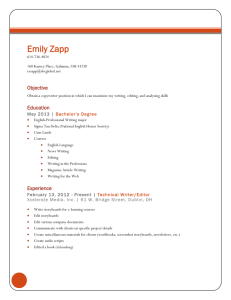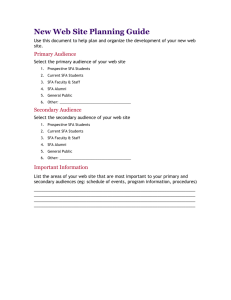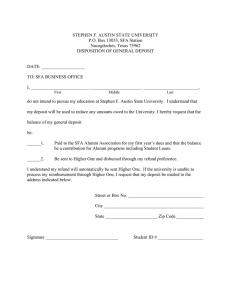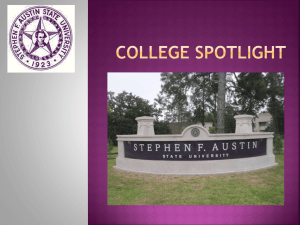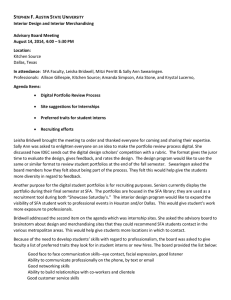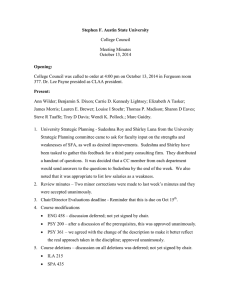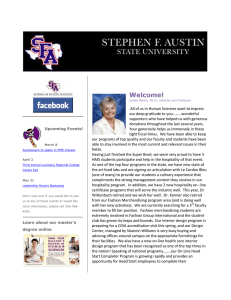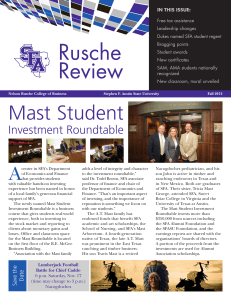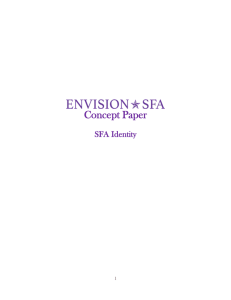SFA University Policy Overview Policy Name Policy Summary
advertisement
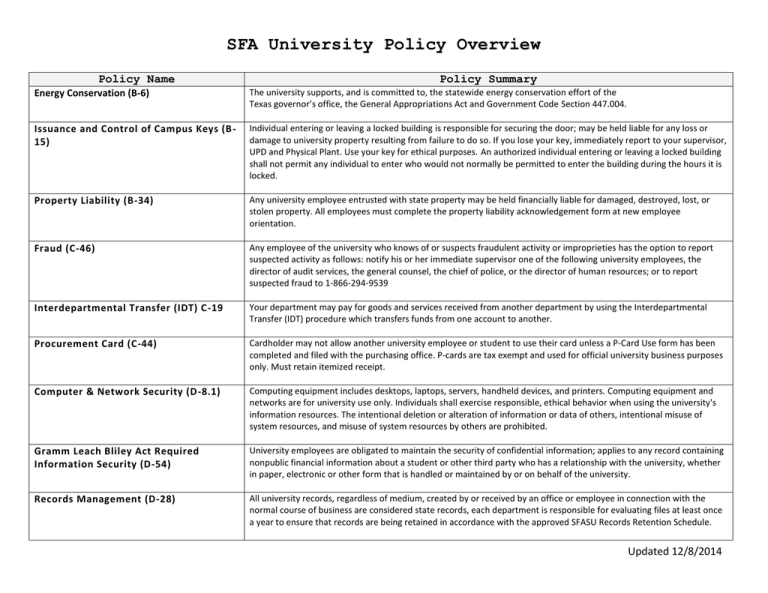
SFA University Policy Overview Policy Name Policy Summary Energy Conservation (B-6) The university supports, and is committed to, the statewide energy conservation effort of the Texas governor’s office, the General Appropriations Act and Government Code Section 447.004. Issuance and Control of Campus Keys (B15) Individual entering or leaving a locked building is responsible for securing the door; may be held liable for any loss or damage to university property resulting from failure to do so. If you lose your key, immediately report to your supervisor, UPD and Physical Plant. Use your key for ethical purposes. An authorized individual entering or leaving a locked building shall not permit any individual to enter who would not normally be permitted to enter the building during the hours it is locked. Property Liability (B-34) Any university employee entrusted with state property may be held financially liable for damaged, destroyed, lost, or stolen property. All employees must complete the property liability acknowledgement form at new employee orientation. Fraud (C-46) Any employee of the university who knows of or suspects fraudulent activity or improprieties has the option to report suspected activity as follows: notify his or her immediate supervisor one of the following university employees, the director of audit services, the general counsel, the chief of police, or the director of human resources; or to report suspected fraud to 1-866-294-9539 Interdepartmental Transfer (IDT) C-19 Your department may pay for goods and services received from another department by using the Interdepartmental Transfer (IDT) procedure which transfers funds from one account to another. Procurement Card (C-44) Cardholder may not allow another university employee or student to use their card unless a P-Card Use form has been completed and filed with the purchasing office. P-cards are tax exempt and used for official university business purposes only. Must retain itemized receipt. Computer & Network Security (D-8.1) Computing equipment includes desktops, laptops, servers, handheld devices, and printers. Computing equipment and networks are for university use only. Individuals shall exercise responsible, ethical behavior when using the university's information resources. The intentional deletion or alteration of information or data of others, intentional misuse of system resources, and misuse of system resources by others are prohibited. Gramm Leach Bliley Act Required Information Security (D-54) University employees are obligated to maintain the security of confidential information; applies to any record containing nonpublic financial information about a student or other third party who has a relationship with the university, whether in paper, electronic or other form that is handled or maintained by or on behalf of the university. Records Management (D-28) All university records, regardless of medium, created by or received by an office or employee in connection with the normal course of business are considered state records, each department is responsible for evaluating files at least once a year to ensure that records are being retained in accordance with the approved SFASU Records Retention Schedule. Updated 12/8/2014 Policy Name Student Records (D-13) Policy Summary The purpose of this policy is to comply with federal law which: (1) grants to students the right of access to their education records, (2) protects students from illegal use of their education records and (3) restricts the disclosure of the social security number of students. Academic: Grades, classification, academic standing, application for admission and admissions scores. Financial: Amount of financial assistance given by university and type of assistance. Disciplinary: Nature of offense and type of university action. Placement: Academic record and documents of recommendations. Health: Medical history to include all treatment by university physicians. Counseling: Test scores and counseling sessions. Training and Certification of University Vehicle Operators (D-36) Reasonable Workplace Accommodation for Disabilities (E-67) Time Clock (E-51.1N) To operate a university vehicle an employee must be designated by their employing department, college, or division as a driver and be certified as an approved driver by the SFA Department of Public Safety (DPS). University shall make reasonable workplace accommodation for any employee having a known physical or mental impairment as defined under the Rehabilitation Act of 1973, the Americans with Disabilities Act of 1990 and the ADA Amendments Act of 2008, or the Texas Commission on Human Rights Act, which does not constitute an undue hardship to the university. No employee may clock in/out more than 5 minutes prior to or 5 minutes after their shift ends; employees are required to clock out any time they leave the work site for any reason other than assigned work duties; employees must clock out for their designated lunch; under no circumstance may one employee punch a time card for another. Time Sheets (E-52N) Student employees are limited to 20 hours per week on combined SFA jobs, unless prior approval is obtained from the Provost and Vice President of Academic Affairs and then may not exceed 40 hours per week under any circumstances. Any fraudulent time sheet submitted could result in disciplinary action. Acceptable Use of Information Resources (F-40) The use of information resources is for SFA academic activities, research and public service. Access to SFA's information resources is a privilege. All users of information resources should act responsibly to maintain the integrity of these resources and abide by all existing SFA codes of conduct as well as local, state and federal statutes. Ethics (E-56) All University employees and officers must maintain high ethical standards in the performance of their official duties. Those statutes contain provisions relating to conflicts of interest, bribery, gifts, official misconduct, and misuse of state property, among other things. Additionally, §556.004 of the Government Code contains a list of prohibited acts of agencies and individuals with regard to political activity. A variety of other Texas statutes contain specific ethics provisions applicable to state employees and officers. All employees and officers are required to abide by applicable state and federal laws and regulations regardless of whether they are specifically stated in this policy. Updated 12/8/2014
